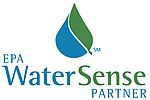Photo by Jessica Rossi.
Water Conservation
Why conserve water in a wet environment like the Lake Champlain basin?
Wasted water contributes to lake pollution. Sewage treatment plants remove phosphorus and other pollutants from the water that leaves our homes and businesses but the efficiency of that removal decreases when sewage is diluted by leaked tap water. Also, municipal drinking water systems often add a phosphorus-containing compound to drinking water to prevent lead from leaching from old pipes. This compound must then be removed from wastewater before it enters Lake Champlain. Removal is not 100 percent efficient, so wasted water leads to additional lake pollution.

Energy Savings
Wasting water also wastes energy. The biggest use of electricity in many communities is supplying water and cleaning it up after it's been used. A lot of energy is consumed to collect, transport, treat and deliver water and wastewater. Water must be pumped from its source to its end use in houses, apartments, businesses and institutions then collected again for treatment. Reducing water use and fixing leaks saves money and lessens demands on the energy-intensive systems that deliver, treat and heat water.

Water Efficiency
Water efficiency saves money, saves energy, and helps protect Lake Champlain. The Lake Champlain Committee is partnering with the Environmental Protection Agency to promote the WaterSense Program. WaterSense works with consumers, retailers, water utilities and governments, and product manufacturers to:
- decrease indoor and outdoor water use through the adoption of more efficient products and practices,
- help consumers make water-efficient choices and adopt simple daily activities that reduce water use,
- encourage innovation in manufacturing,
- establish and standardize rigorous certification criteria that ensure product efficiency, performance, and quality.
The WaterSense label on plumbing fixtures, including toilets, faucets and aerators, gives you assurance that you’re buying efficient products. What commonly is a forgotten practice, fixing leaks throughout your household offers another simple and effective way to reduce your monthly water bill and conserve water. Leaks come in all shapes, sizes and places. A pin-hole size leak can cost home owners 4000 gallons a month, that’s enough to take a shower every day for a year. Leaks also can come through your toilet flapper; an inexpensive fix that helps you save on the monthly water bill.
To find out more about the WaterSense Label, water conservation tips and tips to fix leaks, visit the EPA’s WaterSense website.
On-going Projects
- LCC is promoting the WaterSense label, through a partnership with the EPA, to local communities advocating water efficiency.
- LCC is implementing a multi-pronged outreach program focused on water conservation to reduce phosphorus inputs to waste water treatment facilities.
- LCC provides a number of water conservation outreach materials, including a Water Conservation tri-fold brochure.
The Lake Champlain Committee's water conservation work is funded in part by a grant from the Lake Champlain Basin Program.
